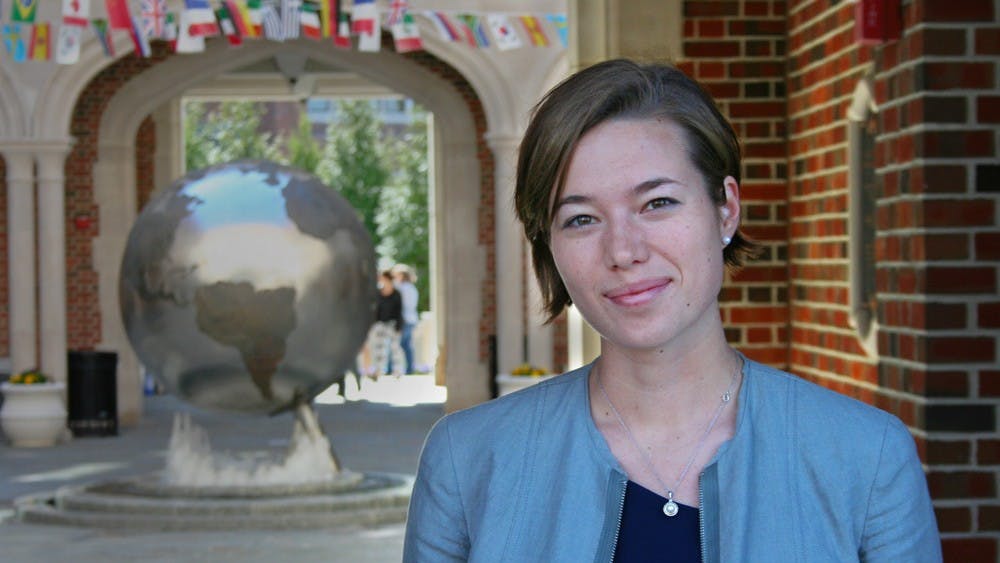Inspired by her personal experiences with migration, Luka Klimaviciute was awarded a $10,000 Davis Projects for Peace grant for developing a program to aid refugees in her home country of Lithuania.
Klimaviciute, a Westhampton College senior with a passion for international studies, is the 11th Richmond student to be awarded a Projects for Peace award. Her three-step program focuses on integrating migrants through education of Lithuanian language and culture, cultivating and embracing their own identities and fostering personal contact between migrants and Lithuanians, she said.
On her 100th birthday, Kathryn Wasserman Davis, philanthropist and founder of the Davis Projects for Peace program, dedicated $1 million to fund 100 student-led peace actions around the world, according to the Projects for Peace website. “My challenge to you is to bring about a mind-set of preparing for peace, instead of preparing for war,” she said.
Klimaviciute said she was prompted to do this project by her experience studying abroad in Chile, Nepal and Jordan as part of an international honors program focused on comparative human rights.
“When I was in Jordan, we ended up visiting different refugee camps, and that was rough,” she said. “I remember we were interviewing an Iraqi family, and we asked them when they decided to run. They said, ‘My five-year-old son brought back a human head one day,’ and they were like, ‘All right. We’re going.’”
There were 15 to 20 asylum seekers living in a bare room, Klimaviciute said, sleeping on mats on the floor. “At a refugee camp, your life is completely at pause, and you have no control over doing anything about it,” she said.
Klimaviciute said she felt overwhelmed with the desire to do something to help them. “In your mind you’re like, ‘This is not fair. This shouldn’t be happening. They didn’t deserve this. They aren’t part of that conflict,’” she said.
When she was writing her proposal, she said she thought back to her time abroad. “I owe it to those people I interviewed,” she said. “You do feel that sense of debt when you have those types of experiences.”
Klimaviciute contacted the Refugee Reception Center in Lithuania as well as the Red Cross, which told her that 1,000 refugees from Iraq, Syria and Afghanistan were going to be relocated to Lithuania in the next two years. There is now a delay in the relocation process because of the Paris and Brussels bombings, she said.
Most of the grant money will go toward buying supplies to teach refugees the Lithuanian language. Klimaviciute, who studies migration and wrote her senior thesis on the topic, said that it was hard to get even a low-paying job without the ability to speak the language.
The next portion of the funding is dedicated to buying supplies for the refugees in their own native languages, because she said most of them were families with children. “When your cultural identity is cultivated and respected, you’re much more likely to integrate into society because you feel like you’re worth something,” she said.
“From my personal experience of coming to the United States, I think that’s true,” she said. “I felt so respected by people who actually cared and wanted to get to know more about my country. That helped me adapt, so I really want to push for the respect of the Syrian culture and the Iraqi culture, especially in a place like Lithuania, which is still very conservative.”
Enjoy what you're reading?
Signup for our newsletter
The last part of the grant will go toward a small potluck of around 40 people on June 20, which is International Refugee day. Stressing the importance of personal contact, Klimaviciute wants to invite family, friends and refugees who live in Kaunas, Lithuania, to get together and celebrate their similarities.
Klimaviciute was introduced to the Davis Foundation as a teenager, when she received the Davis Scholarship, which paid for a private high school education in the U.S. and provided some college funding. The Davis family has made the largest philanthropic contribution ever to global education, she said.
Soon after she enrolled in the university, Klimaviciute said she learned that Richmond participated in the Davis Projects for Peace program. “All right,” she told herself, “I’ve got four years to think about a project. I better do something about this.”
She said there were only five or six other Richmond students that applied for the grant this year, and last year’s numbers were consistent with that.
“It’s a shame that more people don’t apply because it’s a great opportunity,” she said.
Contact reporter Jessie Bursma at jessica.bursma@richmond.edu
Support independent student media
You can make a tax-deductible donation by clicking the button below, which takes you to our secure PayPal account. The page is set up to receive contributions in whatever amount you designate. We look forward to using the money we raise to further our mission of providing honest and accurate information to students, faculty, staff, alumni and others in the general public.
Donate Now


